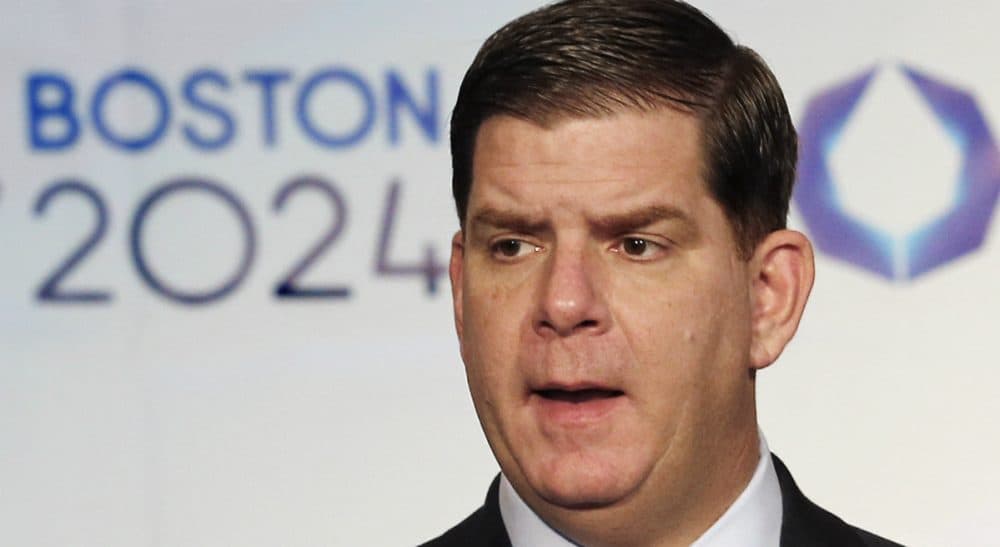Advertisement
On Olympics, Mayor Walsh Finally Came To His Senses

“I cannot commit to putting the taxpayers at risk,” Mayor Walsh said.
That, in the end, sank the bid. On Monday, he refused to sign a contract that would have left the public on the hook for cost overruns incurred by the proposed Boston 2024 Olympic Games. Thus ended a whimsical romance. We will not endure a decade of monumental and monumentally expensive infrastructure, debt and civic production in advance of two of weeks of fun followed by a lifetime of questions.
“No benefit is so great that it is worth handing over the financial future of our city,” Walsh told the proverbial hastily arranged press conference. “And our citizens were rightly hesitant to be supportive as a result.”
The Olympics are complicated and expensive, so necessarily a tough sell. But it would be hard to imagine more inept salespeople than Boston 2024 and the USOC.
Gov. Charlie Baker put a finer point on it last April, as the bid foundered and then-Boston 2024 leader John Fish desperately questioned the patriotism of Olympics opponents. “I think the big issue that the people in Boston and Massachusetts face is that they don’t have a concrete proposal to chew on,” Baker said. As of Monday, as of the end, that was still the case. Even Walsh, always upbeat and glistening, wasn’t able to save Boston 2024 from its contempt for the taxpayers, whose only concern was whether we were being taken for a ride, whether a private consortium was massing to enrich itself, potentially at our expense. Contempt expressed in that naïve flag-baiting as well as eye roll–inducing paychecks and secretiveness with the public purse.
Walsh was forever out front of the people on this quixotic scheme, refusing to recognize the depth and tenacity of public displeasure. He protested that opposition amounted to “about 10 people on Twitter” even as poll after poll showed hardening majority resistance. He always seemed too eager, to the point that he admitted unwittingly signing a gag order preventing city employees criticizing the bid and was forced under pressure to renege. The mayor seemed, overcome by enthusiasm, to have agreed to a contract without reading it.
Still, Walsh deserves credit for pulling out when meeting the USOC’s demands became impossible. So do State House leaders, who, exercising appropriate caution, sought in March to evaluate Boston 2024’s confusing blend of guesses and promises.
The residents of our region are the true motive behind the decision to end the bid, though. It’s not that we’re no fun or are unfit hosts. Quite the opposite — a cosmopolitan sports-hungry people used to droves of foreign visitors and long-term residents, Bostonians are naturals for this sort of thing.
We’re capable of pragmatism, too, though. With the city facing a do-or-die dotted line on which to sign, residents still had never seen solid and appealing plans for venues, just loose, low-effort sketches. We still hadn’t seen financial-protection guarantees or even a credible price tag. Something like $5 billion, they said. London 2012 was something like $14 billion.
We know the challenges that face us in terms of creaky public transportation, lack of affordable housing, a community stratified along class and race lines, and a public education system straining under the weight of impoverished families and discrimination by ZIP code. The bid organizers never made a convincing case that infrastructure for the games would go far in solving these long-term challenges or that their plans were better than alternative visions of Boston’s future, including smaller-scale ones already being realized.
Instead they asked the public to trust them. Giving away taxpayer money, either up front or in cost-overrun guarantees, for mega-events such as the Olympics is a questionable move, though. As Smith College economist Andrew Zimbalist said of Boston 2024’s eight-ball calculations, “Most of the numbers that I look at reflect drunken optimism.” This is not unusual; “every single Olympic Games since 1960 has had an overrun,” he wrote.
What Walsh couldn’t deny is that when this sort of thing goes bad, governments pay.
Zimbalist doesn’t have the last word here. The financial costs and benefits of the Olympics and similar competitions such as the World Cup are always in dispute. Whether the 2012 London games made money or wasted it on contractor fees and white elephant construction remains a matter of both accounting and ideological dispute. What Walsh couldn’t deny is that when this sort of thing goes bad, governments pay. Just ask Dilma Rousseff, the prime minister of Brazil who, on the heels of mass protests surrounding the country’s hosting of last year’s World Cup and the 2016 Olympics, enjoys a 7.7 percent approval rating and is dragging her once-admired party into what may be permanent ruin.
The Olympics are complicated and expensive, so necessarily a tough sell. But it would be hard to imagine more inept salespeople than Boston 2024 and the USOC. Straight talk from those quarters was even scarcer than cogent planning. The people realized this. So did the governor and State House leaders. Eventually the mayor -- disappointed, maybe even defeated, but hopefully wiser — did too.
